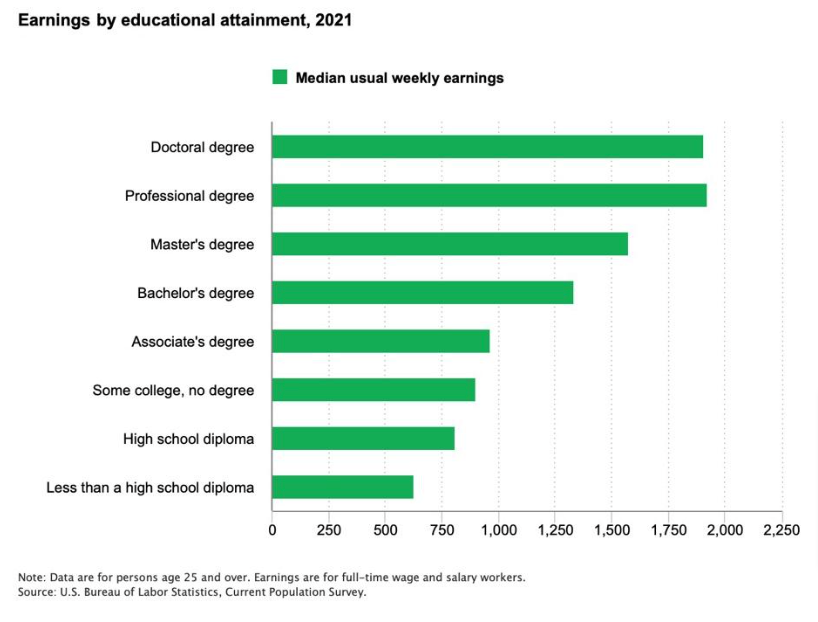Do you feel stifled and suffocated in your current job? Do you think your career has hit a roadblock, slowed down, or is slowing down? Have you ever wondered why that next promotion seems beyond your reach? While there may be several answers to these questions, one of the foremost answers could be the lack of education and the associated knowledge and skills that come with it. Read on to find out how you can get promoted by returning to school or ‘upskilling’ and the benefits of doing so.

Table Of Contents
5 Easy Steps to Get a Promotion
So, if you have decided to do something about obtaining that promotion, here is a step-by-step guide that can be of immense help:
- Identify what areas are “hot” and trending
Keep your eyes and ears open to see what areas are trending and hold promise for better career growth. Look for roles and responsibilities that interest you, your company focuses on, and where you think you could be a good fit. - Identify where you are lacking and what you need
Now that you know what you are aiming for, the next step would be to find out what knowledge and skills you would require to advance into that new role or get promoted. - Speak with your manager or seniors
It is always a good idea to speak with your manager and check if you are on the right track. You can also consult one or two seniors in your company whom you admire for their input and advice. They may be able to point out any flaws in your plan or make meaningful contributions to it. And while you are at it, see if there are opportunities for your company to pay for some of your education. - Get additional qualifications
Now that you have a solid plan to get promoted, enroll in a bachelor, master, or doctoral program that aligns with your interests and objectives. Alternatively, gun for those professional certifications if they fit into your plan. - Network and build relationships
No matter how much you are qualified and skilled, networking plays a large and critical role in advancing one’s career. While at school and in your company, build camaraderie and associations with people who matter and who could help you in your endeavor to get promoted. Forging solid relationships in your school, at work, and outside your company can potentially lead to better opportunities soon.
5 Reasons to Consider Going Back to School
When one finds oneself unable to advance in one’s career, the fundamental problem could be one’s limited educational qualification. Here are some reasons why going back to school or getting additional qualifications may be necessary:
- Your skills are outdated
Examine your current skill set: is it up to date, or might it use some work? New technological tools are released every day, but you have no idea how to use them. Your coworkers are increasing their productivity by implementing new ideas and approaches, but you are still doing things the old way. - Your job is becoming redundant
Your company may recruit fewer people who do what you do, or your duties may be automated or phased out entirely. - You are behind the times
Everyone in your field is raving about a new trend, but you have not heard of it and cannot understand it even after researching. - You want a more prominent role and more responsibility, but you are unable to get it
For years, you have been hoping and trying for a promotion. You consistently go above and beyond and accept more responsibilities to show your boss you can handle them. However, whenever a new position opens, your manager tells you that “you are not yet ready” or “it’s not yet your time.” - Your industry no longer satisfies you
You are eager to grow because your job is not as attractive as it once was. Perhaps you have outgrown your industry, and for several reasons, the industry does not need you anymore. Do you need to change your field? Would you feel more fulfilled if you moved up the corporate ladder, or would you feel the same lack of passion even if you did?
5 Reasons Your Grad Degree Adds Leverage to a Promotion
Earning a postsecondary degree can help you develop your existing abilities, expose you to new fields of study, and prepare you to compete more effectively in the job market. The rewards of furthering your education can be worthwhile even if you have been out of school for some time. Find out why you should go back to school through these compelling reasons:
- Earn more money by being more qualified
This one is a no-brainer. In most instances, the higher the qualification, the higher the salary. A bachelor’s degree is worth about $19,292 more per year than an associate degree, a master’s degree is worth about $12,480 more per year than a bachelor’s degree, and a Ph.D. is worth about $17,420 more per year than a master’s degree, as reported by the U.S. Bureau of Labor Statistics (BLS). - Raise your marketability for better success
A graduate degree can open doors to higher-paying jobs and even promotion opportunities. Employers typically pay those with more education at the outset and provide them with more opportunities for advancement. Your employer may pay for your education depending on how long you want to stay with the company after graduation. - Remain up to date with your knowledge and skills
Staying current with your education has always been vital, especially if you work in a skilled business adapting to new forms of technology or in the medical or educational fields where recertification is routine. Degree programs also tend to adapt to incorporate new technologies, so there is always something new to learn. - Promote yourself and advance in your field
You might already know the potential for professional growth in your field. For example, a master’s degree in business administration (MBA) is a common requirement for upper-level management roles. Obtaining a second degree or additional certifications may be necessary for some specialized jobs, which will undoubtedly help you get promoted and advance your career. - Switch careers with a new degree
Changing fields need not entail starting over if you already have a degree. However, adding newer qualifications and certifications may help you transition to a different career path that could be more lucrative and promising than your current one. A change in career focus may be as simple as earning a new degree that provides marketable skills and knowledge.
How to Get Promoted: Educational Options & 5 Tips to Get Started On Your New Educational Journey
If you have made up your mind that the easiest way to get promoted is by gaining additional qualifications and skills, here are a few options you could explore:
- Obtain a degree in the same discipline
If you have an associate degree, consider a bachelor’s degree, or if you have a bachelor’s degree, consider a master’s degree in the same discipline. For example, a master’s in economics would be the best fit if you already have an undergraduate degree in economics. - Obtain a degree in another field
If you want to switch careers and find that your current degree is useless, opt for one that fits your plan. For example, if you have a master’s in game design but want to switch to another field, you could consider a master’s in data analytics, a master’s in cyber security, a master’s in graphic design, etc. - Obtain a complementing degree
If you have a degree in a specific discipline but think that your promotion hinges on adding value to it, you can opt for a program that is within the scope of the same domain and complements it or is an “extension.” For example, if you currently hold a master’s in political science, consider a master’s in political communication or a Ph.D. in a similar subject. - Obtain academic certifications
If you do not want to go through a four or 2-year degree program, consider graduate certificates offered in your field of study. Graduate certificates are shorter in duration and not as demanding as full-fledged degree programs. - Obtain professional certifications
If you do not want to return to formal school, you can consider certifications offered by professional organizations in your field. For example, if you hold a master’s in counseling psychology degree, you can opt to become a Certified Cognitive-Behavioral Therapist, a credential offered by the National Association of Cognitive-Behavioral Therapists (NACBT). - Upgrade your knowledge and skills through other platforms
If none of the above options suit your plans, you could always look to online platforms offering a variety of courses and certifications, both free and paid. While some such offerings are accompanied by a certificate that may (or may not) be recognized by your employer, others will simply provide additional insights into a topic of your choice and help you up skill. Popular e-learning platforms include Udemy, Coursera, Upskill, Skillshare, Class Central, edX, etc.
How to Get Promoted Without Going Back to School
What if a person wants to get promoted but does not want to do so by going back to school to get a degree or certification? Here are a few tips if you are one such person:
- Understand what you want
The first step to getting promoted without adding additional qualifications to your résumé will be to understand if you qualify for the promotion. Be realistic in setting your sights on that promotion and check to see if it is what you really want and if you can meet the role’s expectations (without the added qualifications). - Build up a support system
Work with your team members, subordinates, and superiors to build a support structure that will help you get promoted and help you slip into the new role easily. The added responsibilities and duties would almost always require the support of your colleagues. - Go beyond your current role
Showcase your potential by “spilling over” onto your targeted role. Your manager should be able to spot your abilities and capabilities and gradually be confident that you may be ripe for promotion. - Make yourself valuable and indispensable
Rather than sticking to your role and being at it 9 to 5, prove to the company that you are good at what you do and gradually take up additional responsibilities and duties that are not exactly in your scope of work. Your managers and company should feel you are adding value and capable of a bigger role. - Make a compelling case and ask for a promotion
When the time is ripe and the opportunity presents itself, put forth a compelling case for why you are the best candidate for promotion. Gather your records, reports, and achievements to show your strengths and abilities. Highlight your skills and experience, present some ideas for the future role (how you can make a difference in the new position), and what additional value you bring.
Conclusion
After conducting a self-analysis and self-inventory, you should now be able to decide whether returning to school is the best course of action for you. Finding the college or program that best suits your needs is the next step if it is in your plan. OnlineMastersColleges can help you locate the program that matches your busy schedule without spending time with rankings, accreditations, curricula, etc., and provides in-depth information on hundreds of colleges, universities, and programs.



